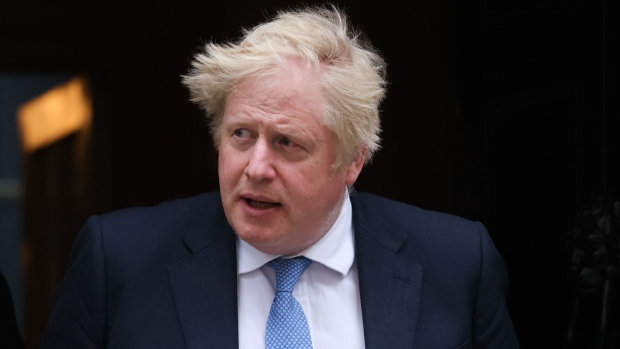Jun 6, 2022
Betting Odds Favor Johnson Winning Vote—and the Pound
, Bloomberg News

(Bloomberg) -- Online betting markets suggest Boris Johnson is the clear favorite to win today’s no-confidence vote. That should support the pound in the immediate term by removing uncertainty, though it may be bad news for the currency in the longer term.
The current policy of brinkmanship over Northern Ireland and Brexit generates conflict with the European Union and threatens trade. It would be easier for an incoming leader to back down. However, monetary policy is likely to be the primary driver of cable, no matter who wins.
Odds from betting on politics should be taken with a large pinch of salt. In markets terms, they reflect the views of retail investors, rather than pros who spend their lives obsessing about these things. Still, Johnson’s Conservative Party has 359 MPs in the House of Commons. It only took 15% of them to trigger today’s vote, but it would take a majority to unseat him. The ballot is secret. A YouGov poll of Conservative Party members showed that most want MPs to keep Johnson in, while 42% said he should be removed. However, Tony Diver, a reporter for the Daily Telegraph, tweeted that rebels claim to have gathered 150 votes against the PM, just 30 short of the majority needed to force a leadership vote.
If Johnson loses, that would spark a new leadership election. Fifty years ago, Tory leaders would emerge through a mysterious backroom process of coronation. Nowadays, the party holds a series of votes with the loser eliminated after every round. Tories traditionally pick their leaders from the ranks of the cabinet and Johnson’s cabinet -- presumably not by coincidence -- lacks strong candidates. Former foreign secretary Jeremy Hunt today said he would vote against Johnson and is the favorite to replace him were he to lose, according to online betting.
If Johnson does win, he can’t be challenged again for another 12 months. The next UK election has to be held by January 2025. Were Johnson to hang on until June 2023, that would allow some margin for Tories to change leaders before a probable 2024 election. On the other hand, Theresa May in 2018 survived a no-confidence vote. Six months later she was on her way out.
- NOTE: Sebastian Boyd writes for Bloomberg’s Markets Live blog. The observations he makes are his own and not intended as investment advice. For more markets commentary, see the MLIV blog
©2022 Bloomberg L.P.







